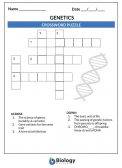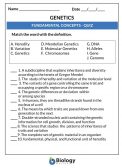Definition
noun
A branch of genetics that deal with the structure and function of genes at a molecular level
Supplement
Genetics is a basically a study in heredity, particularly the mechanisms of hereditary transmission, and the variation of inherited characteristics among similar or related organisms. Some of the branches of genetics include behavioural genetics, classical genetics, cytogenetics, molecular genetics, developmental genetics, and population genetics.
Molecular genetics, in particular, is a study of heredity and variation at the molecular level. It is focused on the flow and regulation of genetic information between DNA, RNA, and proteins. Its sub-fields are genomics (i.e. the study of all the nucleotide sequences, including structural genes, regulatory sequences, and noncoding DNA segments, in the chromosomes of an organism) and proteomics (i.e. the study of proteins from DNA replication). The different techniques employed in molecular genetics include amplification, polymerase chain reaction, DNA cloning, DNA isolation, mRNA isolation, and so on. Molecular genetics is essential in understanding and treating genetic disorders. It is regarded as the most advanced field of genetics. The Human Genome Project was a large scientific research endeavor in molecular genetics. It began in 1990s and finished in 2003 with the intent of identifying the genes and the sequences of chemical base pairs in human DNA.
See also:
 | GENETICS – CROSSWORD PUZZLE Genetics: the study of the patterns of inheritance of specific traits, relating to genes and genetic information. Print this worksheet to expand the student’s vocabulary on the common concepts and terms used in genetics. Subjects: Genetics & Evolution |
 GENETICS BASIC CONCEPTS – QUIZ (pdf) GENETICS BASIC CONCEPTS – QUIZ (pdf) | GENETICS BASIC CONCEPTS – QUIZ This quiz will help you assess the student’s understanding of the various fundamental concepts and principles in genetics. Subjects: Genetics & Evolution |







